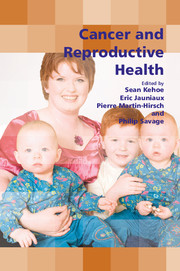Book contents
- Frontmatter
- Contents
- Participants
- Preface
- SECTION 1 Epidemiology, Genetics and Basic Principles of Chemotherapy and Radiotherapy
- SECTION 2 Fertility Issues and Paediatric Cancers
- SECTION 3 Gynaecological Cancers and Precancer
- SECTION 4 Diagnostic Dilemmas
- SECTION 5 The Placenta
- SECTION 6 Non-Gynaecological Cancers
- SECTION 7 Multidisciplinary Care and Service Provision
- SECTION 8 Consensus Views
- 22 Consensus views arising from the 55th Study Group: Cancer and Reproductive Health
- Index
22 - Consensus views arising from the 55th Study Group: Cancer and Reproductive Health
from SECTION 8 - Consensus Views
Published online by Cambridge University Press: 05 October 2014
- Frontmatter
- Contents
- Participants
- Preface
- SECTION 1 Epidemiology, Genetics and Basic Principles of Chemotherapy and Radiotherapy
- SECTION 2 Fertility Issues and Paediatric Cancers
- SECTION 3 Gynaecological Cancers and Precancer
- SECTION 4 Diagnostic Dilemmas
- SECTION 5 The Placenta
- SECTION 6 Non-Gynaecological Cancers
- SECTION 7 Multidisciplinary Care and Service Provision
- SECTION 8 Consensus Views
- 22 Consensus views arising from the 55th Study Group: Cancer and Reproductive Health
- Index
Summary
Research
1. Regarding placental cancers there is a need for more epidemiological studies on the risks of persistent trophoblastic disease after miscarriage and the use of screening using maternal serum human chorionic gonadotrophin.
2. A national cancer and pregnancy database should be developed to include data regarding the outcome of all cases of multiple pregnancy where there is a hydatidiform mole and a normal fetus.
3. Women diagnosed and/or treated for cancer in association with pregnancy should be registered in a specific database, which should include registration and follow-up of their offspring.
4. Further research into the pharmacokinetics of chemotherapeutic agents during pregnancy and lactation, and the effects on placenta, fetus and infant, is required. This should include conventional chemotherapeutic agents and modern targeted therapies.
5. Further developments of fertility-sparing treatments are needed.
6. Existing and novel biomarkers should be validated in pregnancy.
7. Research-based egg and ovarian tissue storage facilities should be developed at a number of collaborating sites in the UK.
8. Guidelines should be developed for the use of frozen sections in pregnancy or otherwise.
Education and training
9. Taking a family history of cancer is imperative, as is a referral to a regional genetic centre if indicated.
10. Young women with early-stage invasive cervical cancer should be made aware of fertility-sparing surgery.
11. There is some evidence that normal naevi do change in pregnancy, but complacency may have contributed to the presentation of thicker melanomas in pregnancy.
- Type
- Chapter
- Information
- Cancer and Reproductive Health , pp. 281 - 284Publisher: Cambridge University PressPrint publication year: 2008
- 1
- Cited by

